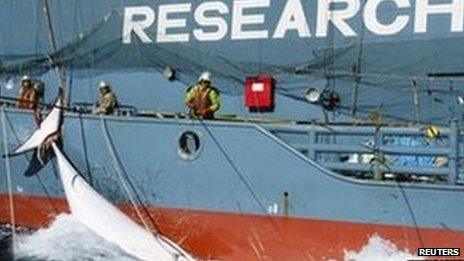New Zealand says Japan whalers 'deeply disrespectful'
- Published

Japan tries to catch 1,000 whales a year for what it calls scientific research
New Zealand has described the entry of a Japanese whaling fleet vessel into its Exclusive Economic Zone (EEZ) as "deeply disrespectful".
The incident happened late last week, as the vessel followed a boat belonging to activist group Sea Shepherd.
New Zealand's diplomats "made it very clear" the ship was not welcome, the foreign affairs minister said.
Japan rejects the criticism, saying the Sea Shepherd vessel tried to disrupt Japanese whaling in the Southern Ocean.
A Japanese government spokesman said under international rules, any ship was allowed to enter another country's declared economic zone, and that it had been necessary to protect Japanese whalers from the activists.
"In these situations, Japan's fishery agency will take the necessary safety measurements to protect Japan's whaling ships.
"As the result of such safety measurements, the Japanese vessel entered the EEZ. Under international maritime law, all countries' vessels are entitled to free passage in the economic zones. In this sense, we don't consider this case as posing any problem under international law."
But New Zealand Foreign Affairs Minister Murray McCully said the Japanese vessel ignored the request, prompting an official protest.
"On my instructions, the Japanese ambassador this afternoon met with a senior MFAT (Ministry of Foreign Affairs and Trade) official who conveyed New Zealand's deep disappointment at the vessel's entry into our EEZ," Mr McCully said in a statement on Monday., external
The summons followed a similar action on Friday, when the most senior Japanese embassy representative present - the deputy head of mission - was called in.
After that meeting, Mr McCully said in a statement, external that Japanese whalers "had been insensitive to the views of New Zealanders by entering New Zealand's EEZ against our wishes".
The decision, he said, was "unhelpful, disrespectful and short-sighted".
The Japanese vessel, the Shonan Maru 2, did not enter New Zealand's territorial waters. It sailed in the EEZ, which lies between 12 and 200 nautical miles from the coastline.
New Zealand "has no legal means of excluding any vessel from entering", the Sunday statement acknowledged.
The Shonan Maru No 2 is one of the escort vessels for the Japanese fleet, which heads south every year to hunt whales.
There has been a ban on commercial whaling for 25 years, but Japan catches about 1,000 whales each year for what it calls scientific research. Critics say it is commercial whaling in another guise.
Activist group Sea Shepherd follows the fleet south and tries to disrupt the hunt. In recent years, there have been numerous clashes and incidents.
Australia, backed by New Zealand, is currently taking action against the Japanese whalers at the UN's International Court of Justice in The Hague.
- Published12 April 2013
- Published1 March 2013
- Published19 December 2012
- Published1 February 2013